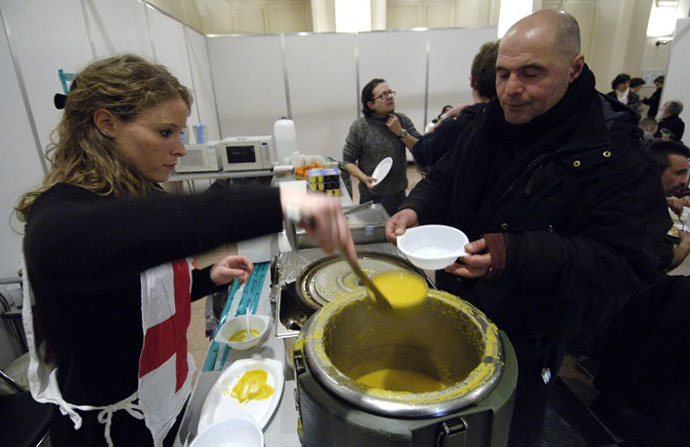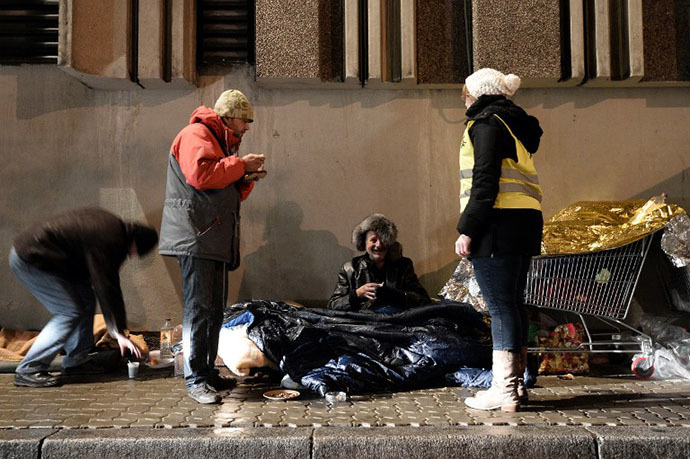‘European social safety net eroded’: IFRC shocked by accumulated poverty data
The European Red Cross and Red Crescent societies are seeing a worrying poverty trend across the continent, in some areas reaching WWII proportions, Anitta Underlin, European director of the Red Cross told RT.
RT:Poverty has struck the European Union –
about 43 million people suffer from material poverty. Why is the
crisis so severe now?
Anitta Underlin: What we have seen since we did
our first survey in 2009 and until 2013 is that the crisis is
really taking root at the community level, at individual level
and at household level to a different degree.
Because people today have used all of their savings, there is
nothing left. Government budgets have been cut because government
power is also under threat from the crisis. And that means that
the whole security net to help the people is really getting
eroded.
RT: What is the Red Cross doing to ease the
situation?
AU: The Red Cross national societies across
Europe – and we are present in 52 countries in the whole West
Europe and East Europe – are responding with different measures.
One of the very classical Red Cross/Red Crescent response
mechanisms is the distribution of food, which has been increased
by 75 percent since 2009.
And the reasons why food has been distributed in so many
countries, including the EU countries, is that people often, even
with small incomes will use all of their available funding to pay
for their housing, electricity bill, heating bill and then when
it comes to buying food for themselves and their children there
is simply nothing left. And many of these families are surviving
upon the assistance from the Red Cross/Red Crescent.

RT:Brussels is promising to reduce the
number of people living in poverty to 20 million in Europe by
2020. Do you think it's possible given that the number is 6 times
that figure now?
AU: Of course as we always say, it is very
difficult to predict the future but what we know is that we are
seeing a rapid decrease in what we call the middle class people.
Basically in countries like Romania, like in Serbia where the
middle class over the last period has been 20 percent. Today,
when we measure it, is 10 percent. And that gives us an
impression of how many people, who had fought their way to become
the middle class in today’s society, now are falling back. And
that is of course a worrying tendency that we see: the middle
class that we know is the survival of society is getting reduced
rapidly.
RT:The UK Red Cross has started asking for
food donations for the first time since World War Two. Your
general director compared the current situation with those days.
Isn't it an exaggeration?
AU: I would say, for example, the British Red
Cross, what they are doing right now and what they lost more than
a month ago, is the biggest food distribution campaign since
World War II. It is serious even for the ones of us working in
this business on a daily basis. We were shocked when we saw the
accumulated data across Europe. What we are trying to do with our
report, which is called “Think Differently” is first and foremost
to make the stakeholders aware at all levels how serious this
situation actually is. Because that is the whole foundation to
make real actions that can help to turn this development into a
better direction.
RT:In the UK the number of people using
food banks has tripled to 350,000 in the past year. And Britain
is not the worst case. What about countries such as Greece and
Romania?
AU: Yes it is completely correct. The countries
that are hitting the media headlines - its Italy, its Greece, its
Spain. And Spanish Red Cross is supporting 1.2 million people
with food which is by all standards impressive.

However what we have to realize is that according to Eurostat
these countries are not in the highest risk. It’s countries like
Romania, Bulgaria, Croatia where people are at a high risk of
extreme poverty. So the crisis is widespread.
You can also go to countries in Central Asia, Kyrgyzstan,
Tajikistan where traditionally a big part of their population are
working abroad and sending home money to their families. Many of
these people are the first ones to lose their jobs, once the
crisis strikes. And that means that they return to their country,
and often without any security net, not only themselves but also
their families are hard hit by the crisis.
So what we can see is that crisis peaks in different parts of
Europe, in different forms. But very few countries can tell that
they are not in one way or another affected by this crisis.
RT:Europe's politicians say that
"austerity" is the only way to get the finances back on track. Do
you agree?
AU: We in the Red Cross/Red Crescent, we are not
politicians but what we know and what research has shown is that
in times of crisis, it is extremely important for example to keep
the social and the health budgets and allocations at the same
level. We know that demands for health services both physical and
psychological are increasing in the time of crisis. We also know
from research that countries that maintain the same level of
these government budgets will recover quicker after the crisis.
And the most extreme factor to prove this is that we see
countries with suicide rates peeking at the same rate as the
crisis.
So for us and one of our recommendations to government are to
keep up the same level of health budgets and social care budgets
in order to make the recovery pass for the society even more
rapidly and easier.
The statements, views and opinions expressed in this column are solely those of the author and do not necessarily represent those of RT.













